The Installation Lap is a weekly Substack column dedicated to helping Americans develop a deeper appreciation for Formula 1.
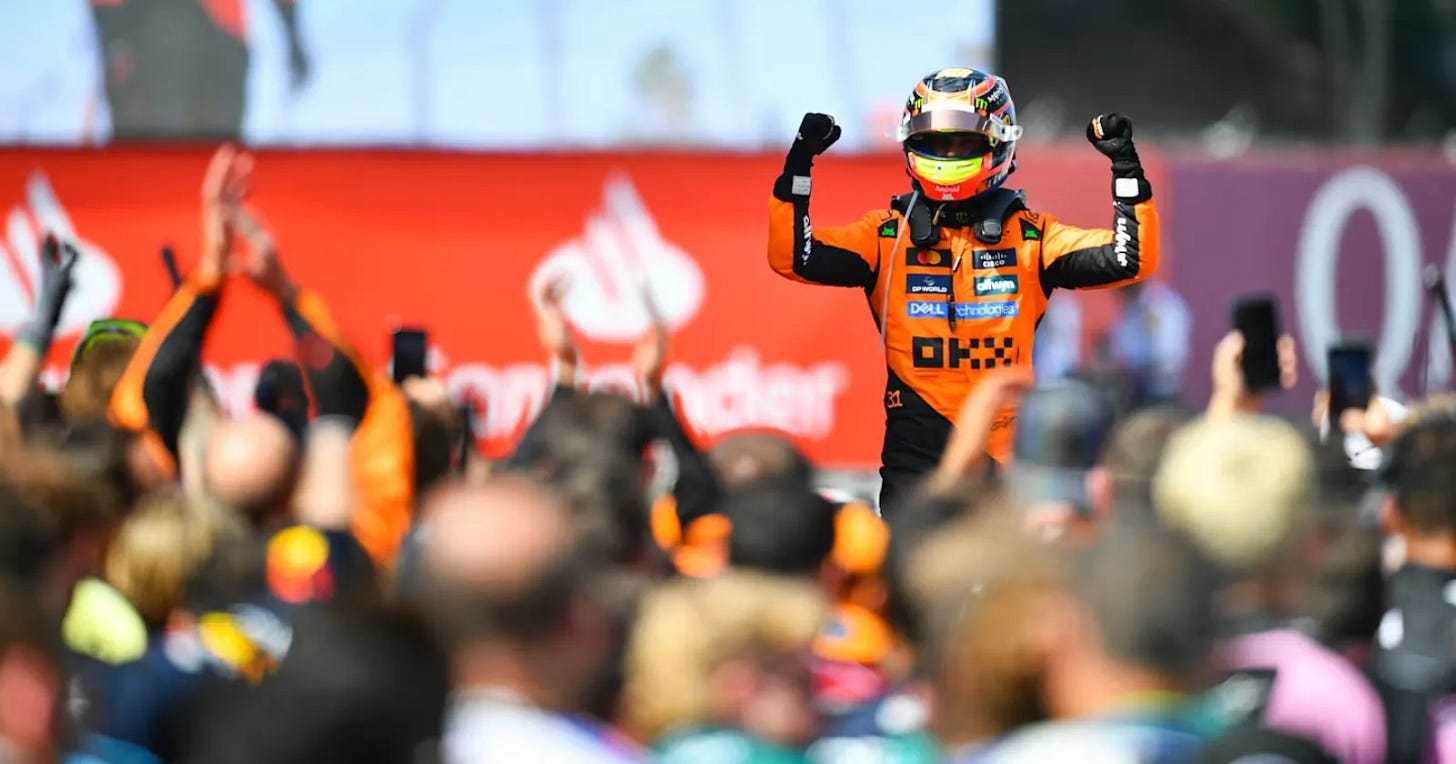
The Spanish Grand Prix feels like a milestone in this year’s championship. Not only did Oscar win in his inimitable cool and controlled style, but, in doing so, he won his fifth race of the season, and he extended his lead in the championship to ten points over his teammate Lando Norris. This is now looking very much like Oscar’s championship to lose. As ever, the caveat that this is a long season applies. Luck can change in an instant. Momentum can swing away from one driver and turn its favor towards another. A DNF for either Oscar or Lando could prove fatal. We saw this in 2016 when the engine of Lewis Hamilton’s Mercedes let go in the Malaysian Grand Prix, effectively putting a nail in the coffin of his Championship hopes that year. It doesn’t take much for the dream to slip away in an instant. Still, even with the caveats applied, Oscar Piastri is looking like the real deal. He had the second-greatest rookie season in F1 history in 2023, and now he has elevated himself to a level where he is outperforming his highly rated teammate and has a 49-point lead over four-time World Champion Max Verstappen. Not too shabby for the kid from Melbourne.
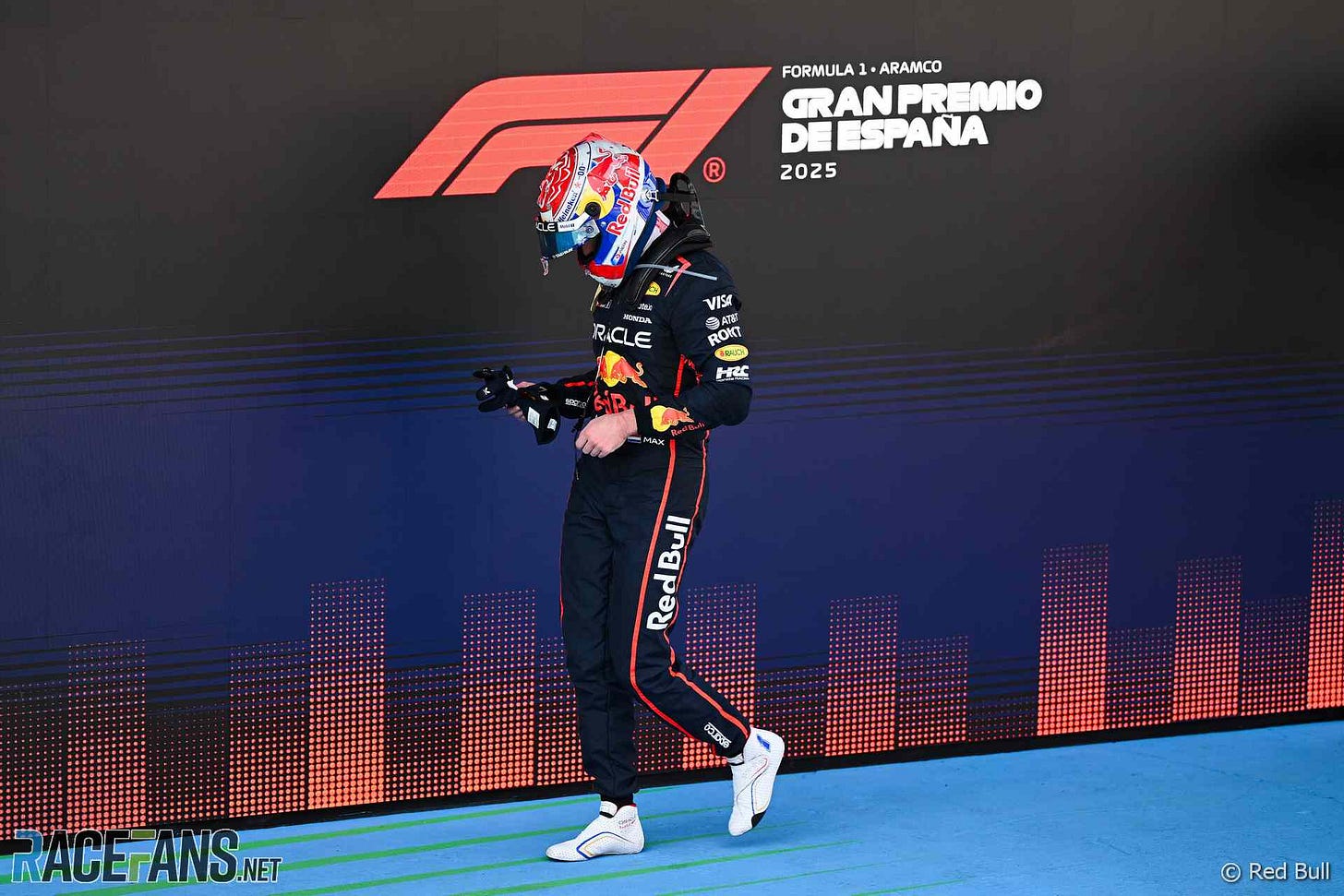
Oscar’s excellent form notwithstanding, this year’s Spanish Grand Prix will most likely be remembered for its contribution to our understanding of the double-edged nature of human genius.
Max Verstappen had a meltdown.
What was fascinating about Max and his behavior on Sunday was that, firstly, before his tantrum, his brilliance had been on full display all afternoon. He was driving a car that was incredibly difficult to drive at the limit. He had a good start to the race, slipping ahead of Lando at the first complex of turns, and he had been managing his tires brilliantly. He was, in short, doing everything one would expect a great champion to be doing on a day when he didn’t have the fastest car. His efforts, to that point in the race, looked to have secured him the best result he could have hoped for on a day when the McLarens were faster; a well-earned third-place finish. Secondly, Max’s meltdown manifested in some very low-stakes situations. Nothing that was happening in Max’s race resembled anything like an all-or-nothing, championship-critical moment. Max and Red Bull gave away a podium and nine points for nothing.
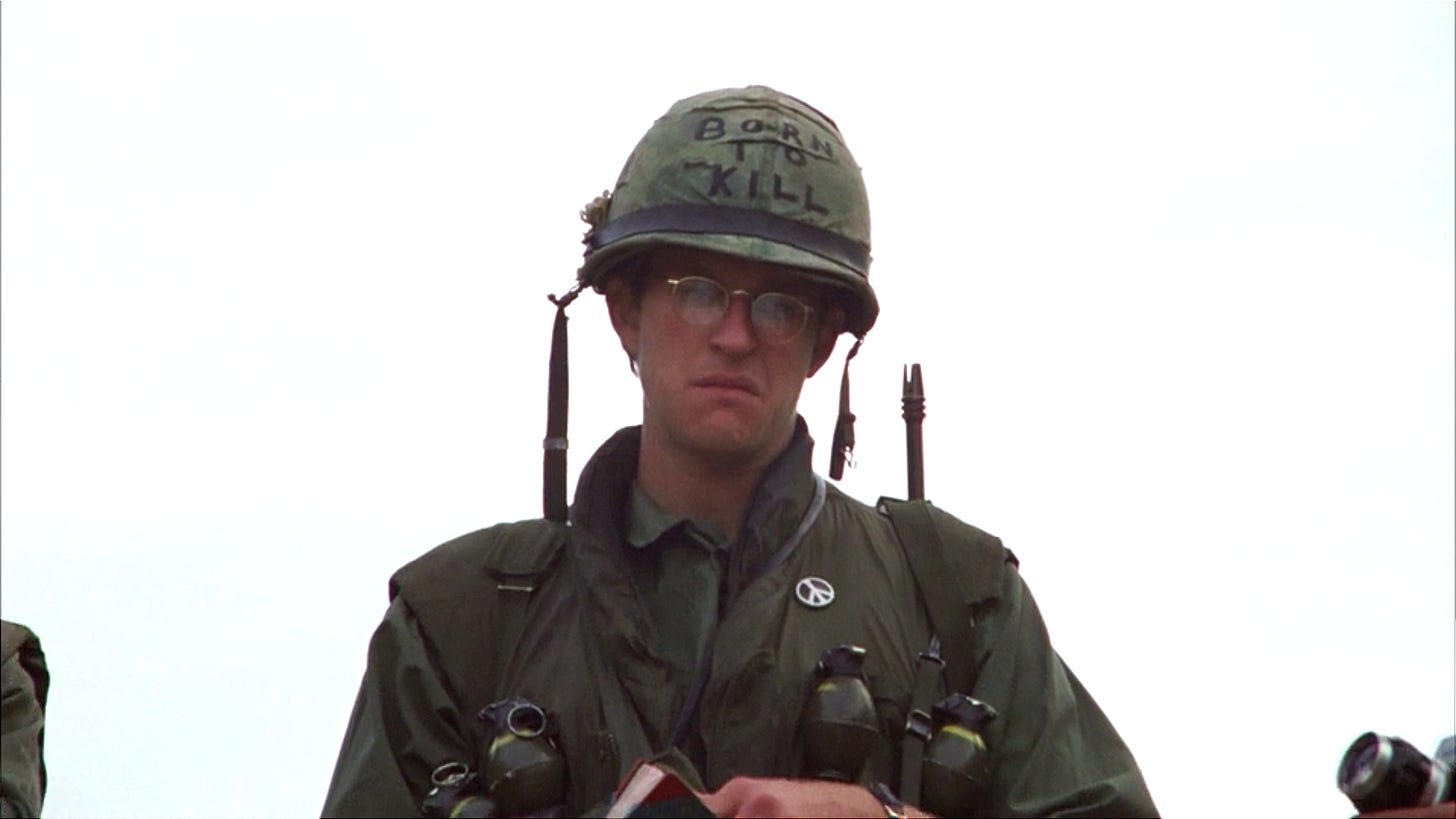
In the Stanley Kubrick classic, Full Metal Jacket, Private Joker, played by a bare-faced boy in 1987, named Matthew Modine, catches the eye of a commanding officer.
Pogue Colonel: What is that you've got written on your helmet?
Private Joker: "Born to Kill", sir.
Pogue Colonel: You write "Born to Kill" on your helmet and you wear a peace button. What's that supposed to be, some kind of sick joke?
Private Joker: No, sir.
Pogue Colonel: You'd better get your head and your ass wired together, or I will take a giant shit on you.
Private Joker: Yes, sir.
Pogue Colonel: Now answer my question or you'll be standing tall before the man.
Private Joker: I think I was trying to suggest something about the duality of man, sir.
Pogue Colonel: The what?
Private Joker: The duality of man. The Jungian thing, sir.
Pogue Colonel: Whose side are you on, son?
Private Joker: Our side, sir.
Pogue Colonel: Don't you love your country?
Private Joker: Yes, sir.
Pogue Colonel: Then how about getting with the program? Why don't you jump on the team and come on in for the big win?
Private Joker: Yes, sir.
The duality of man…indeed. The very fire, talent, and competitive drive that make people like Max so great at what they do can also be the very thing that sews the seeds of their destruction. It took Max fifty-five laps to seal himself a podium with a 16+ second cushion to Leclerc behind. It took just three laps to throw it all away.
On lap fifty-five, the yellow flags flew as Kimi Antonelli’s Mercedes engine let go, stranding him in the gravel at turn 10. It didn’t take long for the Safety Car to be deployed.
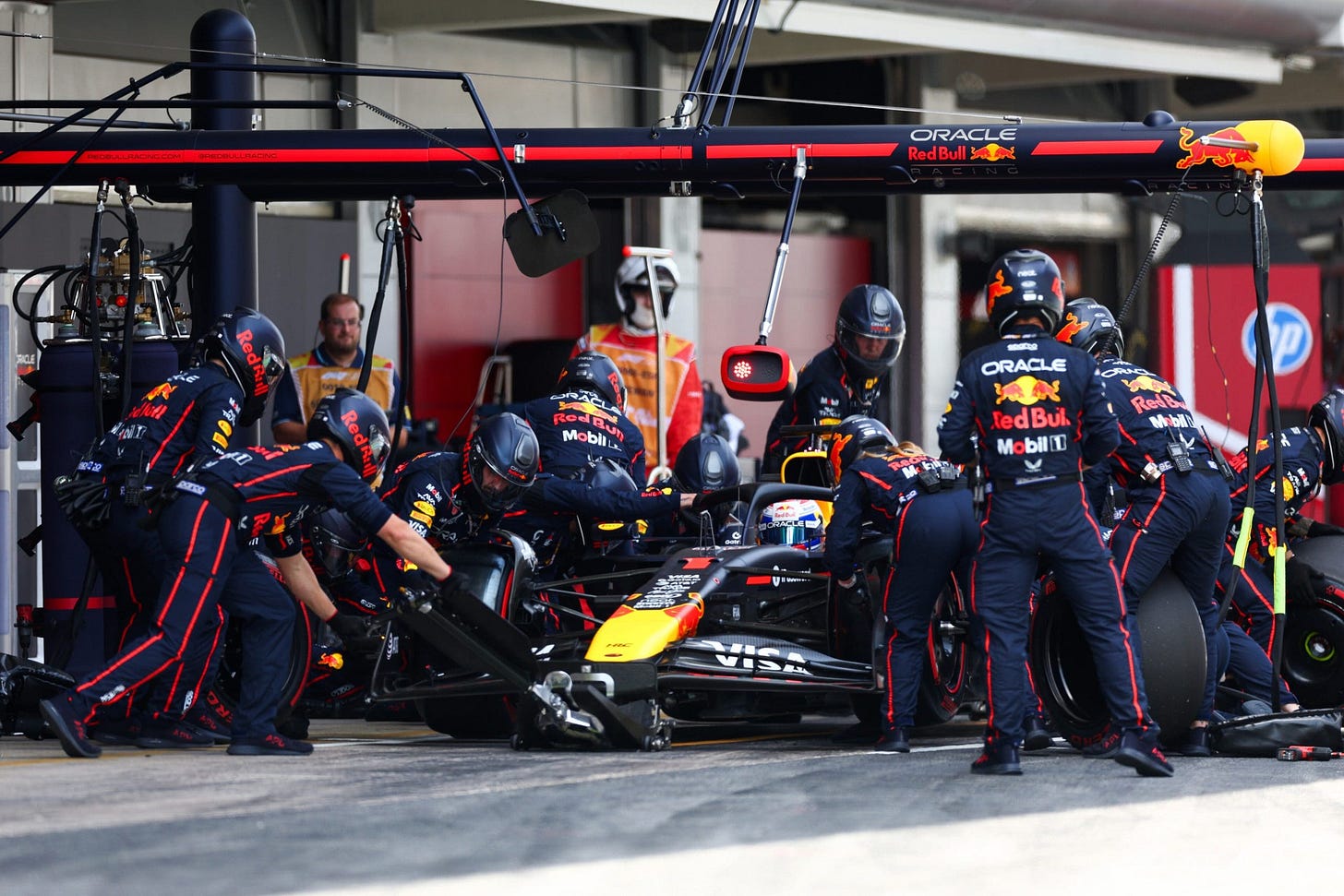
Not only did the safety car wipe out Max’s cushion over Leclerc, which might not have been a big deal as the Red Bull was the faster car all weekend long; but the loss of that cushion ended up mattering when, to Max’s surprise, he pitted under the safety car and found himself fitted with his last remaining set of new tires, a set of hards. At this point, Max jumps on the radio.
Max: What is this tire?
GP: Now, that’s the hard tire, Max.
Max: Why? Why are we on the hard?
GP: That was the only option.
Max, at this point, is already peeved because the hard tire is now going to leave him vulnerable from behind, as Leclerc had fitted a set of soft tires. As we learned via David Croft during the safety car, Max was fitted with the hard tires because that was the only new set of tires he had left. At this point, the entire grid was on soft tires with the exceptions of Ocon, who was on a set of mediums, and Max on his hards.
At the end of lap 60, the safety car peels off, and Oscar takes control of the restart. As the field launches out of the last turn, we get another display of Max Verstappen's brilliance. As he applies the power coming out of turn 14, Max loses the back end of the car. It was a spectacular slide and an even more spectacular save. I honestly don’t know how many drivers on the grid could have saved that slide, but once again, Max’s incredible feel and abilities saved the day. Unfortunately, that slide left him even more exposed to Charles.
Almost instantly, Max and Charles are side-by-side on the straight. At this point, they bump into each other. From the helicopter shot, it appears that this contact is Charles’ fault, but it’s a marginal situation, difficult to read. The stewards look at it and deem it to be a racing incident.
By turn 1, Charles is ahead of Max, and now Max’s worst nightmare is coming true as he is also losing ground to George Russell, who is breathing down his neck.
In turn 1, George dives down the inside of Max, and the two touch. This touch sends Max wide, and he takes the escape road and maintains his place in P4. Max is now properly angry and is on the radio with his race engineer, Gianpiero Lambiase.
Max: Mate! He just rammed into me! He did the same, that’s a penalty!
A delayed message from Max breaks into the broadcast here.
Max: Charles just rammed into me on the straight!
On lap 64, Max’s blood is officially up, and he’s back on the radio.
Max: He [Charles] needs to give the position back!
Later on the same lap, Jean-Pierro comes on the radio.
GP: Max, can you let Russell through, please? Let Russell through.
Max: Nope! I was ahead, Mate, what the fuck?
GP: My advice is to let him through.
Max: Mate, I was ahead he just rammed me off the road!
GP: But that’s the rules. That’s the rules we have to play with. It’s a shame, but that’s the rules.
That conversation took place on the straight. At turn five, Max crashed into George Russell’s Mercedes after looking as if he was going to give the place back.
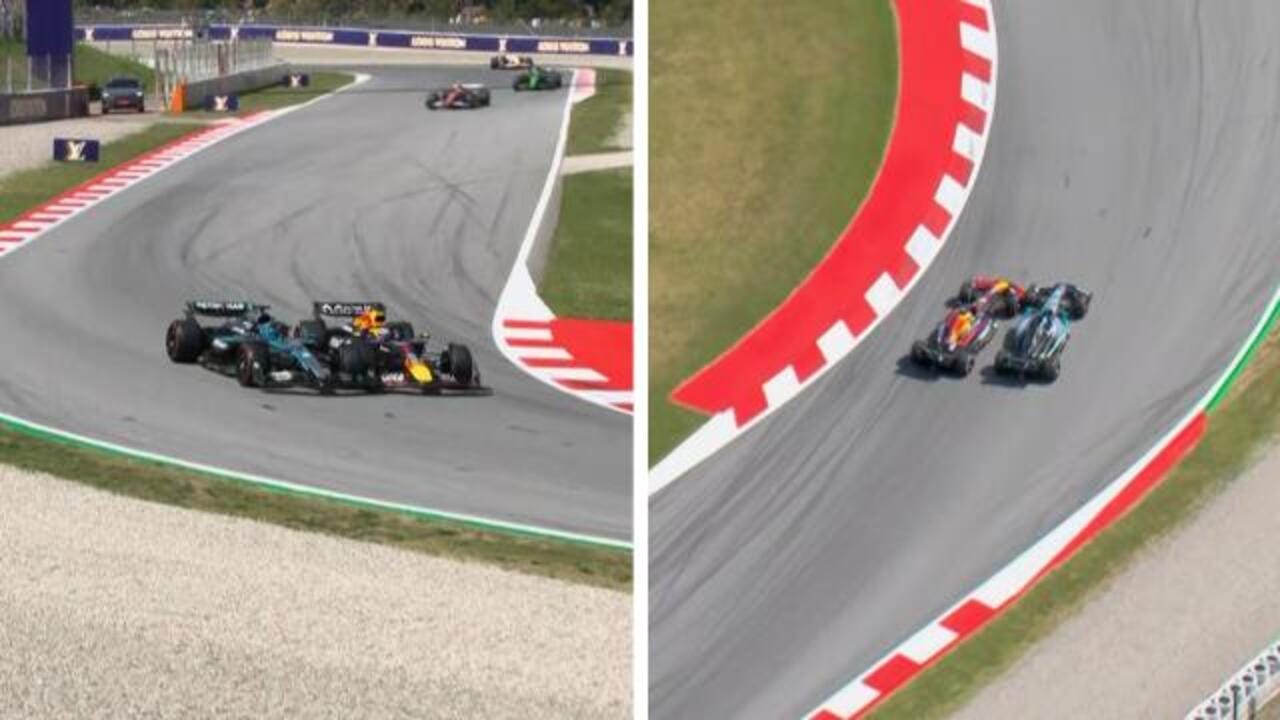
Once the dust had settled, Max had been given a ten-second penalty, which relegated him to P10 scoring just 1 point, and he was given three penalty points on his license, which leaves him a single point away from a one-race ban. Due to the rolling time-scale afforded to penalty points, this means that Max has to avoid trouble until the end of June if he is to avoid a mandatory one-race ban.
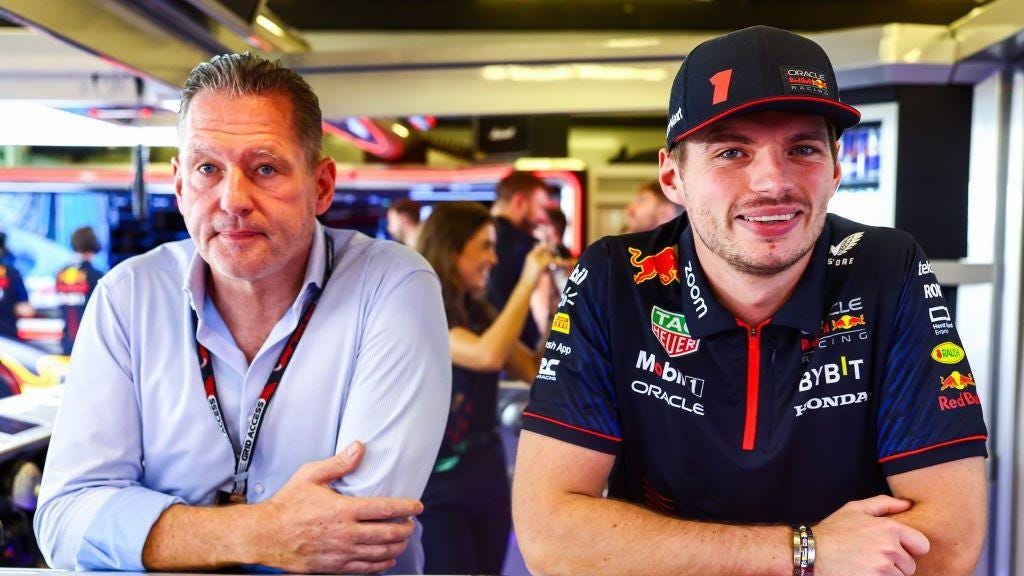
There it is. Max’s life story in microcosm. Other worldly talent, drive, determination. Perfect poise, car control, and once in a generation skill. This heap of gifts is also paired with a short temper, an infantile sense of justice, and a certainty that the entire world is conspiring against him. He has an unreflective self-serving morality around racing, it’s the antithesis of the golden rule, that makes everything he does right, brilliant, and permissible, and if anyone dares race him in the same manner that he races others, then that person must face justice. Justice via the stewards or Max, prescribed, on-track street justice. What’s interesting about this mental and emotional dynamic we see in Max is that it is shared by others. In a recent interview, Toto Wolff and Martin Brundle sat down and in a little role reversal, Toto asked Martin about Ayrton Senna.
"A complex individual, an emotionally driven man. Had the gift I've never seen before. I'll say he knew the grip before and during the corner, and we knew the grip during and after the corner, and he had this sixth sense that he felt that the world was against him. Whether that was the FIA, or whether that was the British F3.” said Brundle. Wolff then chimes in,
“That's the pattern of the great ones, that raises their performance levels.” Wolff interjects.
Punctuating the point later in the conversation, Wolff reiterates,
"They all think that the world is against them, and that really gives them supernatural power.”
Monday morning, Max posted what passes for a racing driver's apology on Instagram.
“We had an exciting strategy and good race i Barcelona, till the safety car came out. our tyre choice to the end and some moves after the safety car restart fueled my frustration, leading to a move that was not right and shouldn’t have happened. I always give everything out there for the team and emotions can run high. you win some together, you lose some together. See you in Montreal.”
You’ll notice the word “sorry” is conspicuously absent from that statement.
In a Sky Sports F1 interview, David Croft spoke about the incident.
“I hope we can draw a line under it to a certain extent as well because these are not the sort of incidents I want to see define Max Verstappen’s career because he is way way better than this sort of incident.”
David Croft is essentially correct in his assessment, though I would add a wrinkle. Max’s talent and his accomplishments are “way way better than this sort of incident,” but Max as a person is not. He has the same fire and force of will that people like Schumacher and Senna had. He has the same sort of ruthlessness that Schumacher and Senna had, and thus, Max will have the same legacy problems that Schumacher and Senna have. Schumacher’s legacy is tainted by his deliberate and dangerous crashing of rivals. Schumacher was disqualified from the entire championship in 1997 for trying to take Jacques Villeneuve out. Senna, for all the might and power of his legend, cannot be discussed without talking about his crash with Prost in Japan in 1990.
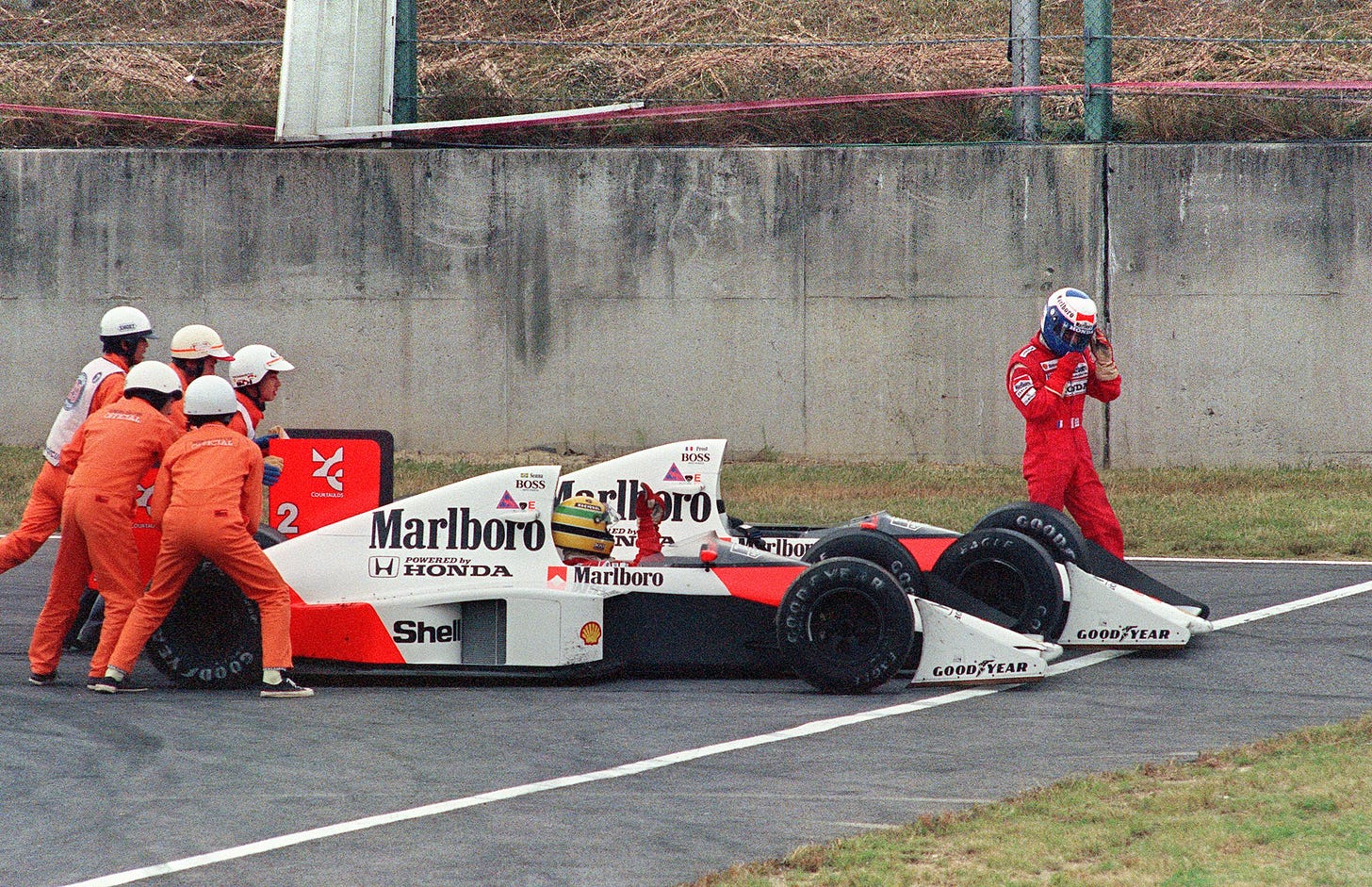
These incidents are already defining Max’s legacy. If that wasn’t bad enough, unlike Schumacher and Senna, Max has been engaging in these needless bouts of vigilante justice with drivers who have few to no Grand Prix wins and no championships to their names. In the rearview mirror of a career, this sort of behavior looms larger than it appears at the moment.
We have ten days until the Montreal Grand Prix, followed by the Austrian Grand Prix at the end of June. Max will be required to keep it clean in these two races if he is to avoid a ban, which would be a terminal blow in his fight for the championship this year. A fight that is already looking like a long shot due to the brilliance of the car McLaren has built.






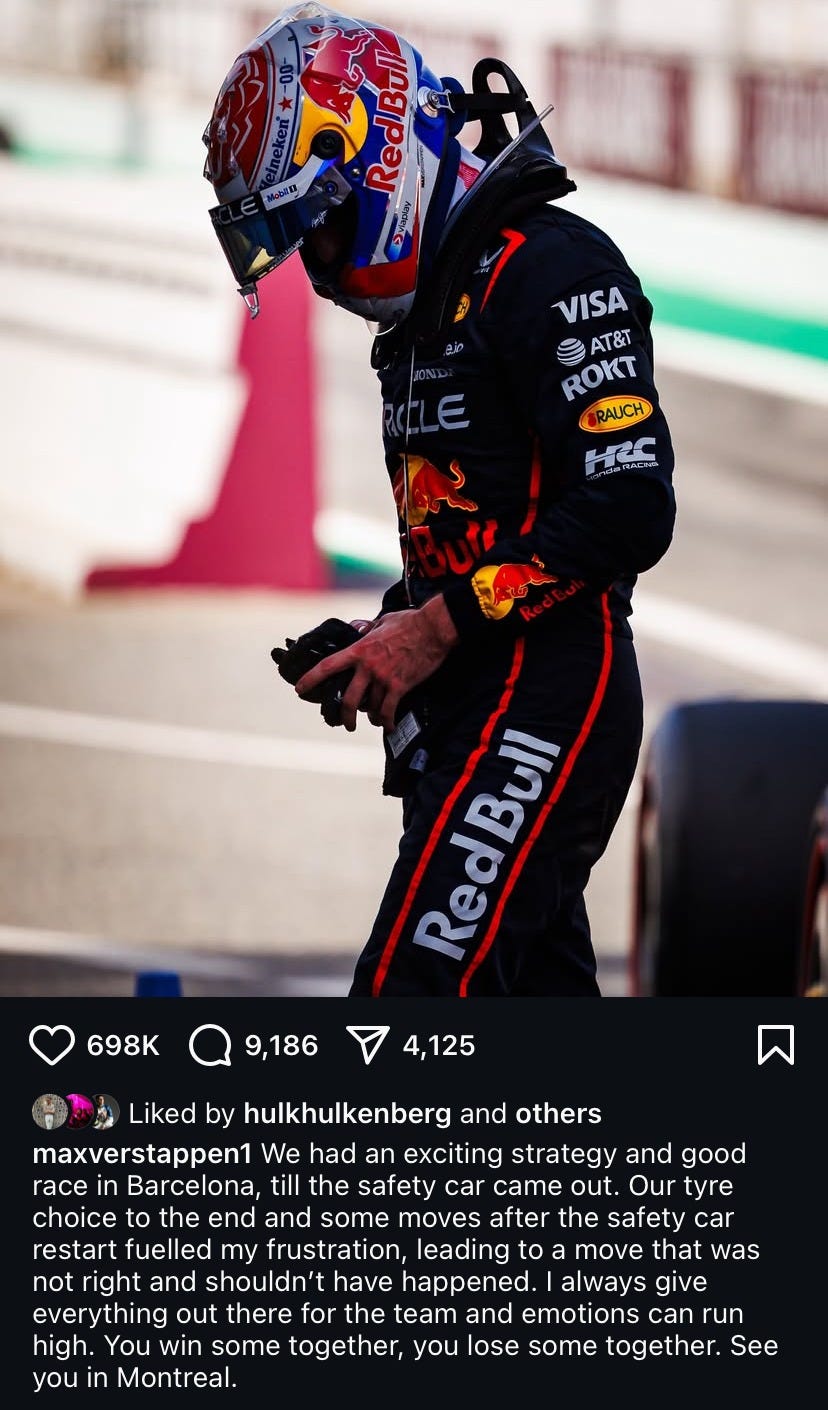

One word that helped escalate the incident..Communication. As I listened, the pit tells Max to give back the position before the stewards tell the pit. If the pit had wait and calmed Max done, which has been done before...things might have been a little different. Max was at fault but I also, blame communications.